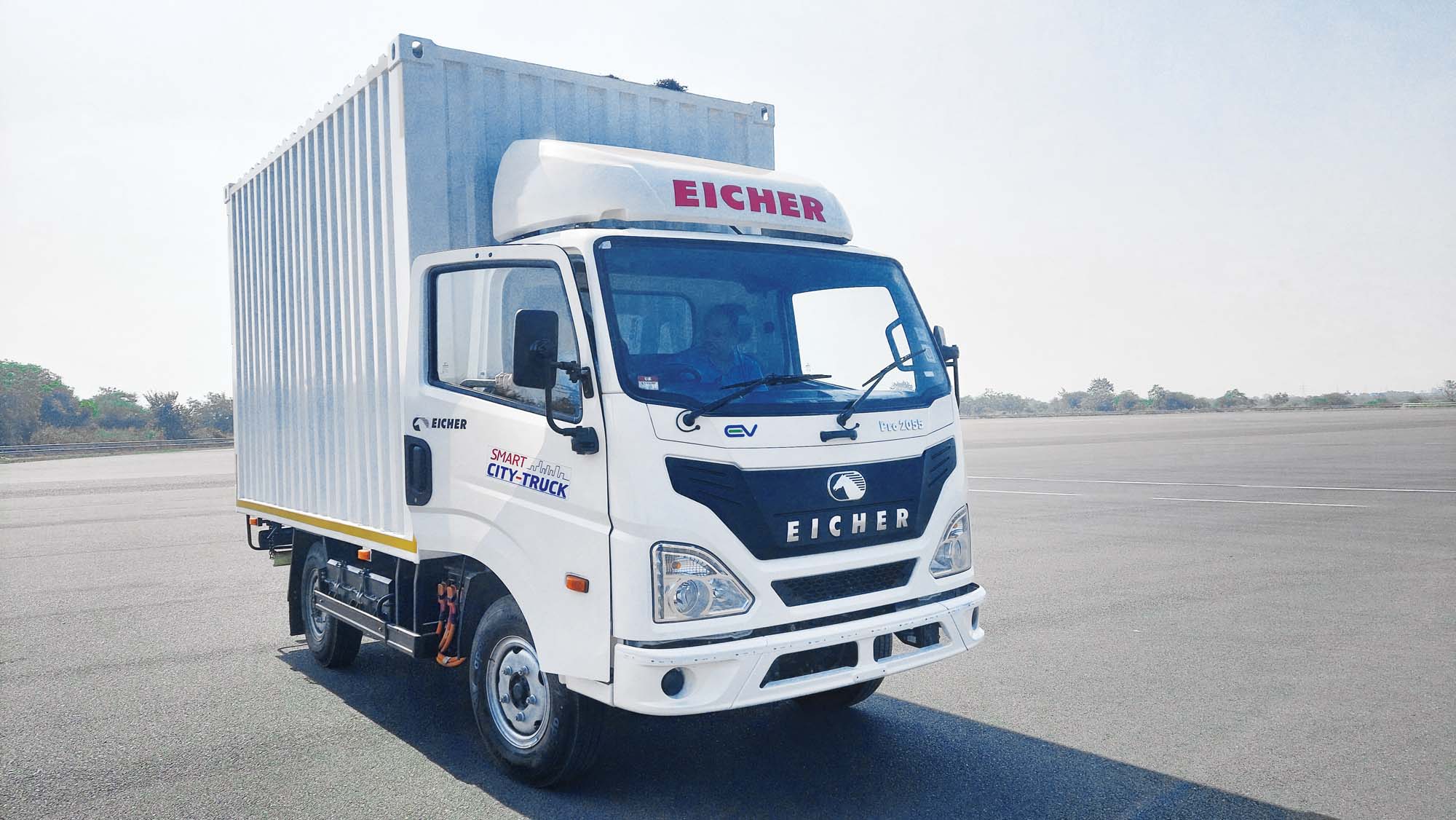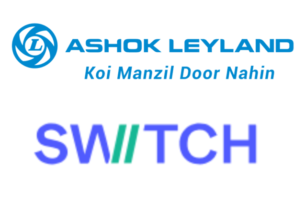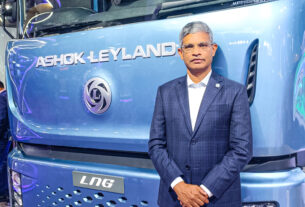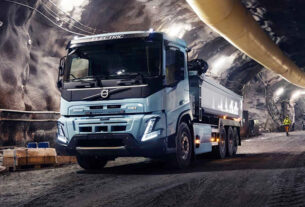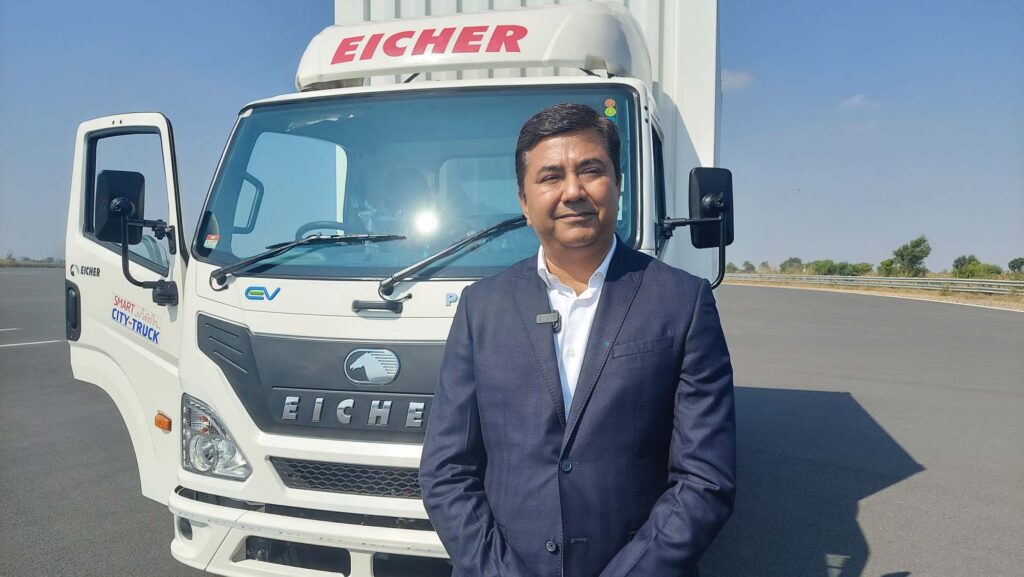
Eicher Trucks and Buses has unveiled the Eicher Pro 2055 EV, a pioneering Smart City Truck designed for last-mile delivery. Featuring a 2.2-tonne payload, a powerful 64 Kw battery, and a remarkable 162 km ARAI range, the truck caters to e-commerce needs with a walk- through cabin, four-wheel disc brakes, and zero emissions. Vishal Mathur, EVP-Light & Medium Duty Sales & Marketing, discussed its urban suitability and successful trials with partners like Amazon. In an exclusive conversation with R. S. Sachdeva, COO of Eicher Trucks and Buses, Rajesh Rajgor explored the EV’s development, proactive charging infrastructure measures, and global export readiness, emphasizing the commitment to sustainable EV solutions.
Eicher Trucks and Buses, a distinguished division of VE Commercial Vehicles Limited, is setting a new benchmark in the Indian market with the unveiling of its Smart City Truck the Eicher Pro 2055 EV in the 5.5 GVW category. Speaking about this groundbreaking development, Vishal Mathur, EVP-Light & Medium Duty Sales & Marketing at Eicher Trucks and Buses, expressed, “I am so happy to showcase you this new truck segment, the first in India – a 5.5 GVW battery electric truck. This truck is a first of its class, equipped with a 2.2-tonne payload capacity, a powerful 64 Kw battery, and an impressive ARAI range of 162 km on a single charge.”
Discussing the truck’s suitability for last-mile delivery in e-commerce and urban applications, Mathur highlighted its unique features, stating, “In practical city applications, we expect at least 125-130 km. This truck is aptly suitable for segments like e-commerce, where last-mile delivery is crucial.” The vehicle boasts a walk-through cabin meeting European crash test norms, four-wheel disc brakes, and zero emissions at the tailpipe.

Reflecting on successful field trials, Mathur provided insights, saying, “We have given this truck to some of the large corporates like Amazon and Safexpress. The truck is running efficiently, providing good uptime and efficiency in last- mile delivery. It has proven to be very efficient in the trials.”
Addressing concerns about the truck’s performance in city traffic, Mathur reassured, “This truck comes with a good 24% gradability, making it strong in terms of its performance, both in terms of carrying payload and maneuvering narrow streets. The 11.6 M turning radius makes it a very maneuverable vehicle in congested roads.”
Emphasizing driver comfort, Mathur spoke about the modern, ergonomic design of the cabin, stating, “Our vehicle comes with a very modern ergonomically designed comfy 2.0 sitting in the cabin. It is a walk-through cabin, European test Norm qualified, ensuring safety and comfort for drivers. In our LMD trucks, we give dual-panel cabins with a very high standard of safety for the driver’s comfort and safety.”
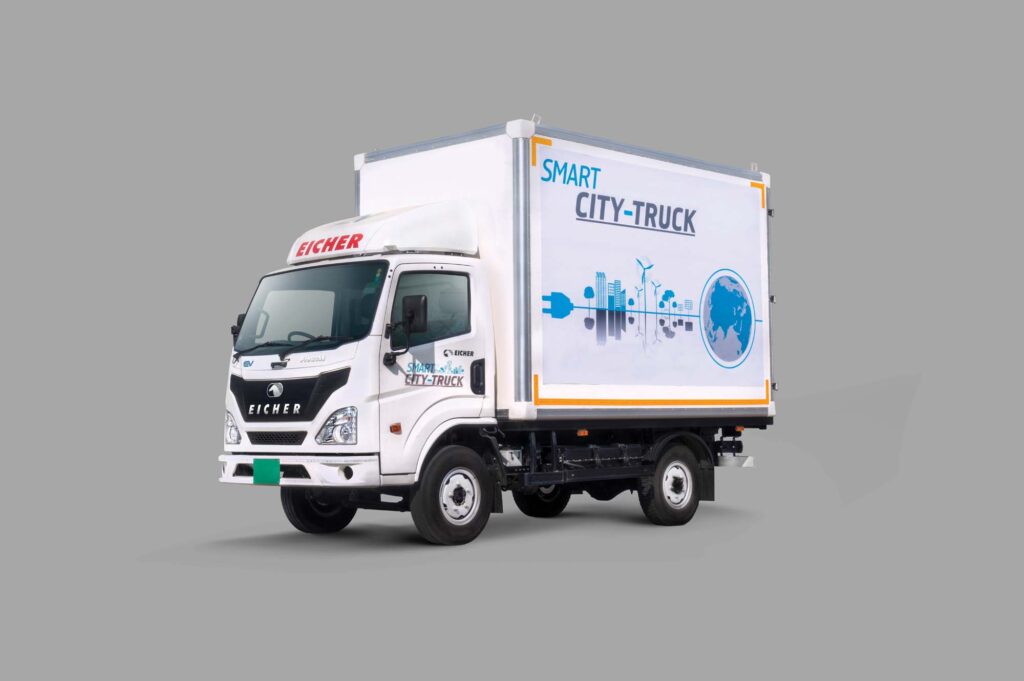
When addressing charging infrastructure concerns, Mathur detailed, “Currently, this vehicle comes with a 64 Kw- hour battery, requiring 2 to 3 hours in a 30 Kw charging infrastructure setup for a full charge. On a regular charger with 7.5 Kw-hour capacity, it takes around 8 to 10 hours. Depending upon the customer requirement and application, the vehicle can be charged at the loading and unloading point, making it very convenient.”
Looking toward the future, Mathur shared Eicher’s commitment to sustainability, stating, “We as Eicher are a very strong player in the LMD truck segment, with a market share of 34% this year. In the electric vehicle segment, we have begun our journey with this truck, offering our customers in the last-mile delivery a very good platform to begin with. We have very good plans to come up with many more products at the appropriate time, addressing market requirements.”
Overwhelmingly Positive Response
Rajesh Rajgor engaged in an exclusive conversation with R. S. Sachdeva, Chief Operating Officer of Eicher Trucks and Buses, during the launch event of the Eicher Smart Electric City Truck, known as the Eicher Pro 2055 EV. Below is the edited excerpt of the conversation:
Can you provide a brief overview of the Eicher Pro 2055 EV truck, also known as the Smart City truck, and the rationale behind choosing the 5.5-ton segment for this electric vehicle?
Certainly. The Eicher Pro 2055 EV, or the Smart City truck, is a revolutionary electric vehicle designed for the last-mile delivery segment in congested urban environments. The decision to focus on the 5.5-ton segment stems from the need to address pollution concerns and bring forth a zero-carbon emission vehicle for last-mile operations. The EV technology is particularly suitable for this segment, offering a range of approximately 150 to 200 kilometers, catering to the requirements of city applications.
How did you approach the development of the Eicher Pro 2055 EV in terms of design and features, especially considering the feedback and needs of potential customers such as parcel and courier services, and e-commerce companies?
Our approach was comprehensive, ensuring the Eicher Pro 2055 EV was purposefully designed for electric vehicle (EV) applications rather than being a mere conversion from diesel to EV. Engaging with our customers in parcel, courier, and e-commerce segments, we identified their need for a cargo vehicle with advanced digital features. This led us to incorporate features such as real-time cargo space utilization information, online range data, and charger availability details. Additionally, we focused on safety, efficiency, and a walk-through cabin design, qualifying for European crash test norms.
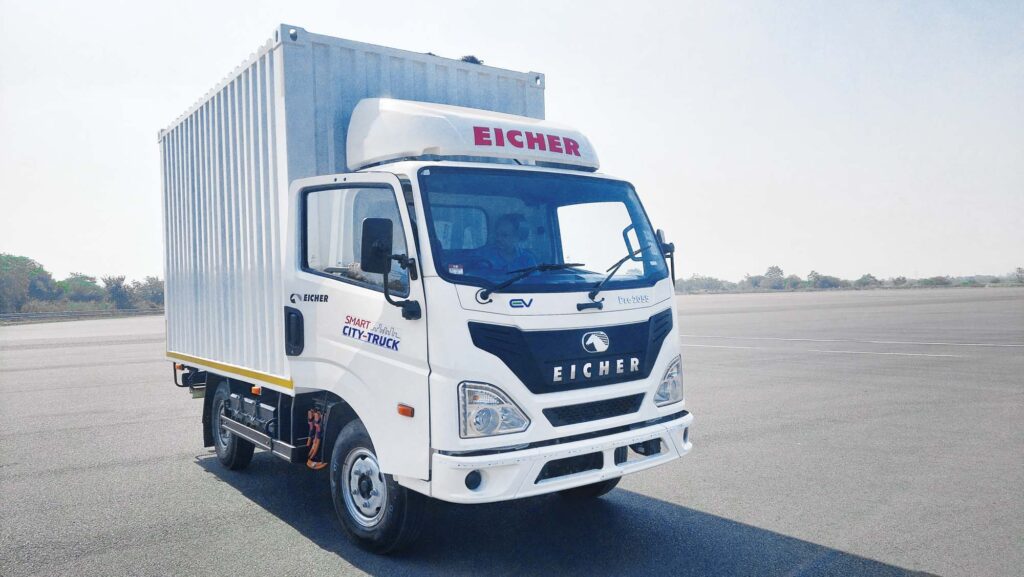
Can you shed light on the Fleet Trials and the feedback received from partners, especially addressing any initial apprehensions they might have had about transitioning to EVs for last-mile operations?
Indeed. During the Fleet Trials, we worked closely with partners, including notable names like Amazon, to gather valuable feedback. Initially, there might have been apprehensions, considering the availability of multiple options like CNG and LNG. However, our commitment to zero-carbon emissions and the positive sustainability goals of organizations like Amazon made the transition appealing to them. The feedback has been overwhelmingly positive, with high vehicle uptime, satisfaction in meeting required ranges, and a focus on safety, given our careful considerations in battery strategy and in-house developed battery management system.
With the increasing adoption of EVs in India, how are you addressing concerns related to charging infrastructure, and are there plans to extend your service network for EV customers?
Charging infrastructure is a crucial aspect, and we’ve taken a proactive approach. Before delivering the vehicle, we ensure a charging infrastructure is in place in the customer’s territory, either through dealerships or public charging points. Additionally, we are meticulous about the after-market service network. Mechanic training, diagnostic tools for efficient problem-solving, and a strategic rollout of charging infrastructure in key markets like NCR, South, and Hyderabad reflect our commitment to providing the best service and eliminating range anxiety for our customers.
Considering the competitive landscape and the presence of diesel counterparts in the 5.5-ton segment, how do you differentiate the Eicher Pro 2055 EV in terms of total cost of ownership and overall efficiency?
The differentiation lies in our focus on the total cost of ownership (TCO). While the acquisition cost may be higher for EVs, the running cost is significantly lower. For customers who understand and value TCO, such as those in e-commerce, we position the EV for last-mile delivery. This strategic approach enables us to cater to both the lower TCO requirements of diesel vehicles and the overall efficiency and sustainability goals of EVs.
Regarding production capacity and market readiness, when can customers expect the Eicher Pro 2055 EV to be readily available, and how is the production strategy being implemented?
Our production facilities are well-equipped, with investments made two years ago. The Eicher 2055 EV is already being manufactured on our assembly line in Bhopal. As customer interest grows, we are gradually increasing production and have already commenced bulk supplies this month. Our approach involves a phased proliferation into markets, ensuring a smooth transition and readiness to meet growing demands.
In terms of global expansion, do you see the potential for exporting Eicher’s EVs to other markets, and have you encountered interest or demand from regions beyond India?
Absolutely. Our EV technology has been benchmarked globally, and we find it suitable for export. We’ve received orders from the Middle East and South Africa, where we are converting the vehicles for both left-hand and right-hand drive. Our technology aligns well with global standards, and we are actively preparing for export markets, making necessary adaptations to suit different regions.
Looking ahead, what are Eicher’s medium to long-term goals and plans for the EV segment, considering the evolving technology landscape and market demands?
Our medium to long-term goals align with the evolving technology landscape. For vehicles below 18 tons and buses, EV technology is suitable, and we have benchmarked our technology with Volvo group. However, for heavier commercial vehicles, we are exploring hydrogen internal combustion engines. Prototypes are ready, and customer trials are on the horizon. Simultaneously, we are cautious about transit technologies like CNG and LNG, preparing for the shift towards EVs and hydrogen. Importantly, our R&D is closely connected to Volvo’s roadmap, ensuring our strategies are aligned with global advancements.


